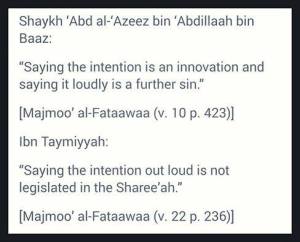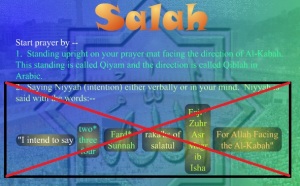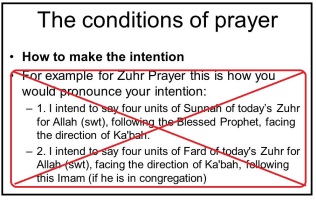
(continued from part 1)
Skipping Suhoor
Some of us are too lazy or sleepy to eat Suhoor or just don’t think it’s important. Even if you don’t feel like having a lot of food, just eat something little; a few dates, even a glass of water. That’s because the Prophet SallAllaahu 3Alayhi wa Sallam said:
Eat suhoor for in suhoor there is blessing” (1)
It was narrated from Jaabir that the Prophet SallAllaahu 3Alayhi wa Sallam said:
Whoever wants to fast, let him eat something for suhoor.” (2)

Stopping Suhoor at ‘Imsaak’
Some people stop eating Suhoor 10-15 minutes earlier than the time of Fajr to observe ‘Imsaak’. They think they cannot eat beyond that time and that it would be wrong if they did.
Shaykh Ibn 3Uthaymeen was asked about some timetables which give the time of imsaak as being approximately one-quarter of an hour before Fajr. He said:
This is a kind of bid3ah (innovation) which has no basis in the Sunnah. Rather the Sunnah is to do the opposite. Allaah allows us to eat until dawn: “and eat and drink until the white thread (light) of dawn appears to you distinct from the black thread (darkness of night)” [al-Baqarah 2:187]
And the Prophet SallAllaahu 3Alayhi wa Sallam said: “….eat and drink until you hear the adhaan of Ibn Umm Maktoom, for he does not give the adhaan until dawn comes.”
This ‘imsaak’ which some of the people practice, is an addition to what Allaah has prescribed, so it is false. It is a kind of extremism in religion, and the Prophet SallAllaahu 3Alayhi wa Sallam said:
“Those who go to extremes are doomed, those who go to extremes are doomed, those who go to extremes are doomed.” (3)
Not fasting if they missed Suhoor
Sometimes, our alarm doesn’t go off on time and we miss the time for eating, just barely waking up with the adhaan. I’m sure this has happened to all of us one time or another. In this situation, there are some people who are too scared to fast if they miss Suhoor. They think they will feel too weak during the day or that, by default, missing Suhoor automatically means NO fast that day.
But, if you think about it, unless a person has a genuine health problem, it is not such a big deal after all. What if you missed a few morsels of food? You’ll be fine in-shaa’-Allaah. Alhamdulillaah most of us have enough fat stored in our bodies to keep us going for several days without food!
Remember, obedience to Allaah takes precedence over everything.
Shaykh Salih Al-Munajjid said: “If a Muslim does not eat suhoor or does not wake up for Fajr, this is not counted as a reason for him not to fast.” (4)
Saying the intention to fast ‘out loud’ or saying a specific dua to start fasting
The intention is an action of the heart. We should resolve in our heart that we are going to fast tomorrow. That is all we need. It is not prescribed by the Shari’ah for us to say out loud, “I intend to fast”, “I will fast tomorrow” or other phrases that have been innovated by some people.
Also, there is no specific du3aa’ to be recited at the time of starting the fast in the correct Sunnah. Whatever du3aa’ you may see on some papers or Ramadaan calendars, etc. is not from sunnah.

Delaying breaking fast
Some people wait until the adhaan finishes or even several minutes after that, just to be ‘on the safe side’. However, the Sunnah is to hasten to break the fast, which means breaking fast whenever the adhaan starts, right after the sun has set. Aa3ishah radi Allaahu 3Anha said: This is what the Messenger of AllaahSallAllaahu 3Alayhi wa Sallam used to do.
The Prophet SallAllaahu 3Alayhi wa Sallam said:
“The people will continue to do well so long as they hasten to break the fast.” (5)
Al-Nawawi said:
This hadeeth urges us to hasten to break the fast as soon as it is established that the sun has set. What this means is that the ummah will continue to be in a sound state and they will be fine so long as they continue to adhere to this Sunnah. (6)
Eating continuously until the time for Maghrib is up
Some people put so much food in their plates when breaking their fast and continue eating, enjoying dessert, drinking tea, etc., until they miss Maghrib. That is obviously not right.
What one should do is to hasten to break the fast by eating small morsels that will calm one’s hunger, then get up to pray, then if one wishes, one may come back and eat more.
This is what the Prophet SallAllaahu 3Alayhi wa Sallam used to do. (7)
Missing the golden chance of having your Du3aa’ accepted
The prayer of the fasting person is guaranteed to be accepted at the time of breaking fast. The Prophet SallAllaahu 3Alayhi wa Sallam said:
“There are three whose du3aa’ will not be rejected, …………..the fasting person when he breaks his fast…” (8)
Instead of sitting down and making Du3aa’ at this precious time, some people forego this beautiful chance, and are too busy frying ‘samosas’, talking, setting the food, filling their plates and pouring drinks into their glasses and they lose this golden opportunity.
Think about it…. Is food more important than the chance to have your sins forgiven or the fulfillment of your Du3aa’?
Not fasting because of exams or work
Exams or work is NOT one of the excuses allowed by the Shari3ah to not fast. You can do your studying and revision at night if it is too hard to do that during the day.
Shaykh Ibn Baaz was asked about that and he replied:
It is not permissible for an adult of sound mind to break the fast during Ramadaan because of exams, because that is not one of the excuses permitted in Islam. Rather he has to fast and do his studying at night if it is hard for him to do it during the day. Those who are in charge of exams should be kind to the students and arrange the exams at a time other than Ramadaan, so as to serve two purposes: the purpose of fasting and that of giving students time to prepare for the exams.
The Standing Committee said:
It is not permissible to break the fast for the reason you mentioned, rather that is haraam, because it is not included among the excuses for which it is permissible to break the Ramadaan fast. (9)
Also remember that pleasing and obeying Allaah is much more important than ‘good grades’. Besides, if you will fulfil your obligation to fast, even if you have to study, Allaah will make it easy for you and help you in everything you do.
“Whosoever fears Allaah, He will appoint for him a way out and provide for him from where he does not expect, Allaah is Sufficient for whosoever puts his trust in Him.” (Soorah at-Talaaq, v: 2-3)
Fasting and not wearing Hijaab
Women’s observing hijab in front of non-mahram men and covering their faces is something that is obligatory as is indicated by the Book of our Lord and the Sunnah of our Prophet SallAllaahu 3Alayhi wa Sallam. (10) The correct view is that a woman is obliged to cover her entire body, even the face and hands. (11)
If a woman does not wear hijab, then she is disobeying her Lord thereby, but her fast is still valid, because sins, including not wearing hijab, do not invalidate the fast, but they detract from its reward (12)
Lavish Iftaar parties
Although inviting each other for breaking fast is something good and encouraged, some people go to extremes with lavish ‘Iftaar parties’ with all sorts of disobedience to Allaah, from flirting, mixing of the sexes and hijaab-less women, to show-off and extravagance, to heedlessness to Salaah and Taraaweeh, to even music and dancing.
Mixing fasting and dieting
DO NOT make the mistake of fasting with the intention to diet. That is one of the biggest mistakes some of us make, especially the sisters.
Fasting is an act of worship and should only and only, be for the sake of Allah alone. Otherwise, mixing it with the intention of dieting may become a form of (minor) Shirk. Sure, there are always added benefits of obeying Allaah, one of them being, losing weight while fasting. That comes in automatically, so reap the benefits but don’t make it part of your intention. If the side benefits come, they come. If they don’t, that shouldn’t stop you from obeying Allaah and fulfilling your duty.
Fighting over the number of Raka3ah of Taraweeh
There is no specific number of rak’ahs for Taraweeh prayer, rather it is permissible to do a little or a lot. Both 8 and 20 are okay.

Shaykh Ibn 3Uthaymeen said:
“No one should be denounced for praying eleven or twenty-three (rak3ah), because the matter is broader in scope than that, praise be to Allaah.” (13)
What is really important, my brothers and sisters, is the command to observe night prayers during Ramadaan, which is encouraged without specifying a particular number. As long as we are praying our Taraaweeh, it shouldn’t be a matter of dispute or disunity whether it is 8 or 20 or even more. And of course, what really counts is that Allaah accepts it from us, even if it is two rak3aat, right?
Praying ONLY on the night of the 27th
Some people pray ONLY on the 27th to seek Lailat ul-Qadr, neglecting all other odd nights, although the Prophet SallAllaahu 3Alayhi wa Sallam said:
“Seek Laylat ul-Qadr among the odd numbered nights of the last ten nights of Ramadaan.” (14)
Wasting the last part of Ramadhaan preparing for Eid
Some people waste the entire last 10 days of Ramadaan preparing for 3Eed, shopping and frequenting malls, etc. neglecting 3Ibaadah and Laylatul Qadr, although, the Prophet SallAllaahu Alayhi wa Sallam used to strive the hardest during the last ten days of Ramadaan in worship and not in shopping.
3Aa’ishah Radi-Allaahu 3Anha said:
“When the (last) ten nights began, the Messenger of Allaah SallAllaahu Alayhi wa Sallam would tighten his waist-wrapper (i.e., strive hard in worship or refrain from intimacy with his wives), stay awake at night and wake his family.” (15)
May Allaah guide us to practice what we learn, spend Ramadaan as is pleasing to Him and may we reap the fruits of Ramadaan and may Allaah accept our Ramadaan. Aameen.
By Asma bint Shameem
Edited & modified by TowardsHuda
Read part 1 here
Related Posts:
Time Management Tips for Ramadaan
RCTS – Ramadaan Cooking Tips for Sisters [New]
Tips To Avoid Distractions During Ramadaan
How to Spend Ramadaan by Shaykh Muhammad Hassan
=======================================================
References:
(1) Narrated by al-Bukhaari, 1923; Muslim, 1095
(2) Narrated by Ahmad, 14533; classed as saheeh by al-Albaani in al-Silsilah al-Saheehah, 2309
(3) http://islamqa.info/en/12602 and http://islamqa.info/en/1155
(4) http://islamqa.info/en/37943
(5) Al-Bukhaari (1957) and Muslim (1098)
(6) http://islamqa.info/en/50019
(7) http://islamqa.info/en/13999 and http://islamqa.info/en/366
(8) al-Tirmidhi (2525), classed as saheeh by al-Albaani in Saheeh al-Tirmidhi.
(9) Fataawa al-Lajnah al-Daa’imah, 10/240. http://islamqa.info/en/60296
(10) http://islamqa.info/en/11774
(11) http://islamqa.info/en/21536
(12) http://islamqa.info/en/107624
(13) Fataawa al-Shaykh Ibn ‘Uthaymeen, 1/407
(14) Bukhaaree & Muslim
(!5) Bukhaaree & Muslim
Share the khayr & be rewarded






























Recent Comments